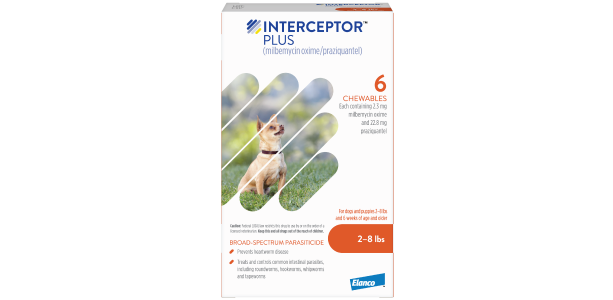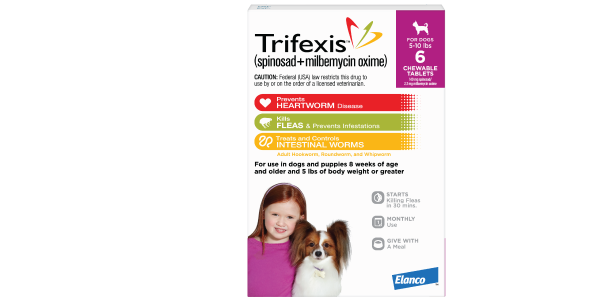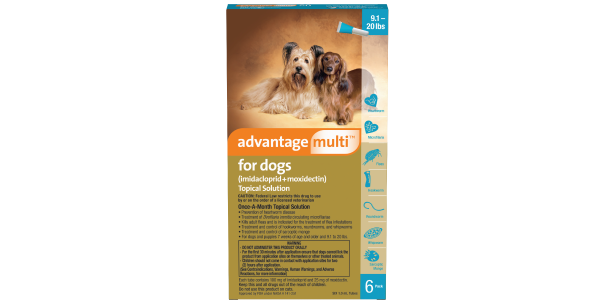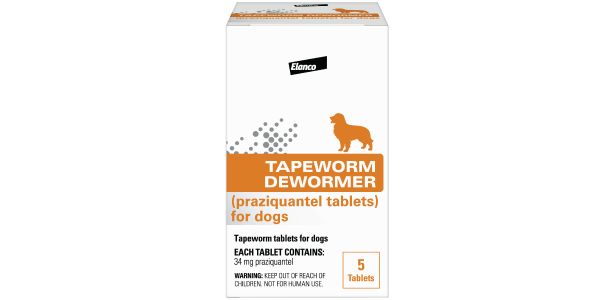Intestinal parasites often hide in plain sight.
Roundworms, hookworms, whipworms and tapeworms — your dog may come in contact with one or more of these intestinal worms at some point in their life. In fact, intestinal worms are quite common. If you’ve ever seen your dog eat grass, dirt or feces, or if your pet goes to the dog park regularly, these factors and behaviors can put your dog at risk for intestinal parasites.
Here are the five most common ways dogs pick up worms.
1. Eating Worm Eggs or Worm Larvae
Risk of: Roundworms, hookworms, whipworms
Roundworm and whipworm eggs are deposited in the soil from the droppings of infected animals. These eggs can survive in the soil for long periods of time and even in harsh environmental conditions. If dogs accidentally eat these eggs — by sniffing or licking the ground, or by eating dirt or grass — they can become infected.
Your dog can contract hookworms by accidentally ingesting hookworm larvae found in the soil. They can also get hookworms through close skin contact with larvae left in soil or sand. The larvae, which are tiny living worms, can burrow into the skin on their feet.
People can inadvertently bring worm eggs into their home on their shoes, too. If you have stepped on soil or vegetation that’s harboring roundworm eggs, whipworm eggs or hookworm larvae, these can be tracked into your home, putting your dog at risk for accidentally ingesting them.
2. Hunting Behavior
Risk of: Roundworms, hookworms, tapeworms
Dogs aren’t the only ones eating parasite eggs. If your dog likes to hunt or scavenge, they could catch worms from other infected animals like rodents, rabbits, birds and even insects like roaches and earthworms that have eaten worm eggs. Unlike in dogs, the eggs ingested by these animals stay in a hibernating state instead of developing into adult worms. Once the eggs are eaten by a dog, however, they “wake up” and develop into adult worms. Keep an eye on where your dog roams to help keep them from scavenging these potentially dangerous animals.
3. Grooming
Risk of: Tapeworms, roundworms
Your dog could also get worms just from trying to keep clean. Roundworm eggs can attach themselves to your dog’s coat, and if your dog swallows any while grooming, a new roundworm infection may develop. To limit this risk, it’s never a bad idea to give your dog a bath after they have been rolling around in the dirt or roughhousing in the yard or garden.
4. Fleas
Risk of: Tapeworms
If your dog is suffering from a flea infestation, they are also at risk of picking up an intestinal worm. Fleas are common transmitters of tapeworms, and if your dog swallows infected fleas when grooming, they could develop tapeworms. Regularly groom your dog, check for fleas with a flea comb and keep up with your routine flea prevention program to reduce the likelihood of a flea infestation in your dog and home.
5. From Mother to Pup
Risk of: Roundworms, hookworms
Roundworm, one of the most common worms affecting dogs, can be transmitted from an infected mother to the unborn puppies in her womb via the placenta before they’re even born.
An infected dog could also pass roundworms and hookworms to her puppies during nursing. This means nursing puppies are at risk of continual exposure to these parasites as well.
Roundworm and hookworm can be extremely dangerous in young puppies and can even be fatal in severe cases. If you have recently adopted a young dog, check with your vet to see when you can begin worming treatments for your puppy.
When Is Worm Season?
As you can see, worms can be found in your dog’s environment every day, and your dog can be at risk for infection any time of the year. Most worm eggs are hardy and can survive environmental extremes (including harsh winters) for up to several years. It’s important to always be aware and on guard against worms all year long, though warmer weather can especially increase the risk of worms to your dog.
How to Treat Intestinal Worms in Your Dog
If your dog has worms, don’t panic — it’s common for many dogs to be infected with some type of worm in their lifetime. Effective dewormers are readily available to get rid of any intestinal worms your dog has contracted.
Implementing a broad-spectrum deworming product into your routine according to label instructions and testing your dog for parasites yearly can help your pup stay healthy and protect them from a range of intestinal worms, including roundworms, hookworms, whipworm and tapeworm.

Interceptor® Plus (milbemycin oxime/praziquantel)
A monthly chew that protects dogs and puppies 6 weeks or older and 2 pounds or greater against heartworm disease, adult hookworm, roundworm, tapeworm and whipworm infections.

Trifexis® (spinosad + milbemycin oxime)
A beef-flavored tablet that kills fleas and prevents flea infestations, prevents heartworm disease, and treats and controls adult hookworm, roundworm and whipworm infections.

Advantage Multi® for Dogs (imidacloprid + moxidectin)
WARNING: DO NOT ADMINISTER THIS PRODUCT ORALLY. For the first 30 minutes after application ensure that dogs cannot lick the product from application sites on themselves or other treated animals. Children should not come in contact with the application sites for two (2) hours after application. (See Contraindications, Warnings, Human Warnings, Dosage & Administration, and Adverse Reactions for more information.)

Drontal® Plus (praziquantel/pyrantel pamoate/febantel)
Drontal® Plus is a safe and effective way to treat and control the most common intestinal worms in dogs. Available with a veterinarian's prescription.

Quad Dewormer (praziquantel/pyrantel pamoate/febantel) for Dogs
Nonprescription broad-spectrum dewormer that is effective against tapeworms, roundworms, hookworms and whipworms. Not for human use. Keep out of reach of children.

Tapeworm Dewormer (praziquantel tablets) for Dogs
An easy and effective way to remove common tapeworms from dogs. Not for human use. Keep out of reach of children.
Interceptor® Plus (milbemycin oxime/praziquantel)
Indications:
Interceptor Plus prevents heartworm disease and treats and controls adult roundworm, hookworm, whipworm, and tapeworm infections in dogs and puppies 6 weeks or older and 2 pounds or greater.
Important Safety Information:
Treatment with fewer than 6 monthly doses after the last exposure to mosquitoes may not provide complete heartworm prevention. Prior to administration of Interceptor Plus, dogs should be tested for existing heartworm infections. The safety of Interceptor Plus has not been evaluated in dogs used for breeding or in lactating females. The following adverse reactions have been reported in dogs after administration of milbemycin oxime or praziquantel: vomiting, diarrhea, decreased activity, incoordination, weight loss, convulsions, weakness, and salivation. For complete safety information, please see Interceptor Plus product label or ask your veterinarian.
Trifexis® (spinosad + milbemycin oxime)
Indications:
Trifexis prevents heartworm disease. Trifexis kills fleas and prevents flea infestations, and treats and controls adult hookworm, roundworm and whipworm infections in dogs and puppies 8 weeks and older and 5 pounds or more.
Important Safety Information:
The use of ivermectin at higher than FDA-approved doses at the same time as Trifexis can result in serious side effects. Treatment with fewer than three monthly doses after the last exposure to mosquitoes may not provide complete heartworm prevention. Prior to administration of Trifexis, dogs should be tested for existing heartworm infection. Use with caution in breeding females. The safe use of Trifexis in breeding males has not been evaluated. Use with caution in dogs with pre-existing epilepsy. The most common adverse reactions reported are vomiting, decreased activity, itching, decreased appetite, and diarrhea. To ensure heartworm prevention, observe your dog for one hour after administration. If vomiting occurs within an hour of administration, redose with another full dose. Puppies less than 14 weeks of age may experience a higher rate of vomiting. For complete safety information, please see Trifexis product label or ask your veterinarian.
Advantage Multi® for Dogs (imidacloprid + moxidectin)
Indications:
Advantage Multi® for Dogs is a once-a-month topical solution for the prevention of heartworm disease, the treatment of circulating microfilariae, killing adult fleas, the treatment of flea infestations, the treatment and control of sarcoptic mange, and the treatment and control of hookworm, roundworms and whipworms infections in dogs and puppies that are at least 7 weeks of age and that weigh at least 3 lbs.
Important Safety Information:
CAUTION: Federal law restricts Advantage Multi® for dogs to use by or on the order of a licensed veterinarian.
WARNING: DO NOT ADMINISTER THIS PRODUCT ORALLY. For the first 30 minutes after application ensure that dogs cannot lick the product from application sites on themselves or other treated animals. Children should not come in contact with the application sites for two (2) hours after application. (See Contraindications, Warnings, Human Warnings, Dosage & Administration, and Adverse Reactions for more information.) CONTRAINDICATIONS: Do not use this product on cats.
Drontal® Plus (praziquantel/pyrantel pamoate/febantel) for Dogs
Indications:
Drontal Plus: This drug is indicated for removal of Tapeworms (Dipylidium caninum, Taenia pisiformis, Echinococcus granulosus, and removal and control of Echinococcus multilocularis). For removal of Hookworms (Ancylostoma caninum, Uncinaria stenocephala), Ascarids (Toxocara canis, Toxascaris leonina), and Whipworms (Trichuris vulpis) in dogs.
Important Safety Information:
Drontal Plus: CAUTION: Federal (U.S.A.) law restricts this drug to use by or on the order of a licensed veterinarian. DOSAGE: Not for use in puppies less than 3 weeks of age or weighing less than 2 lbs. CONTRAINDICATIONS: Do not use in pregnant animals. WARNING: Keep out of reach of children. For full safety information, see product label for tablets or product label for taste tabs.
Quad Dewormer (praziquantel/pyrantel pamoate/febantel) Chewable Tablets for Dogs
USES:
Quad Dewormer (praziquantel/pyrantel pamoate/febantel) Chewable Tablets for Dogs will remove common tapeworms (Diplydium caninum and Taenia pisiformis), remove common hookworms (Anclostoma caninum, Unicaria stenocephala), remove common roundworms (Toxocara canis and Toxascaris leonine) and remove whipworms in dogs (Trichuris vulpis).
Important Safety Information:
Consult your veterinarian for assistance in the diagnosis, treatment and control of parasitism; consult your veterinarian before administering the tablets to weak or debilitated animals; do not deworm a dog or puppy that is sick; consult your veterinarian for diagnosis of the illness and appropriate care. Not for use in puppies that are younger than 3 weeks of age or dogs weighing less than 2 lbs. May be given directly in the mouth or offered in a small amount of food. WARNING: Keep out of reach of children.
For complete directions for use and safety information see product label.
Tapeworm Dewormer (praziquantel tablets) for Dogs
USES:
TAPEWORM DEWORMER (praziquantel tablets) FOR DOGS will remove the common tapeworms, Dipylidium caninum and Taenia pisiformis, from dogs and puppies.
Important Safety Information:
WARNING: Keep out of reach of children. Not for human use.
Not intended for use in puppies less than four (4) weeks of age. For complete directions for use and safety information see product label.


